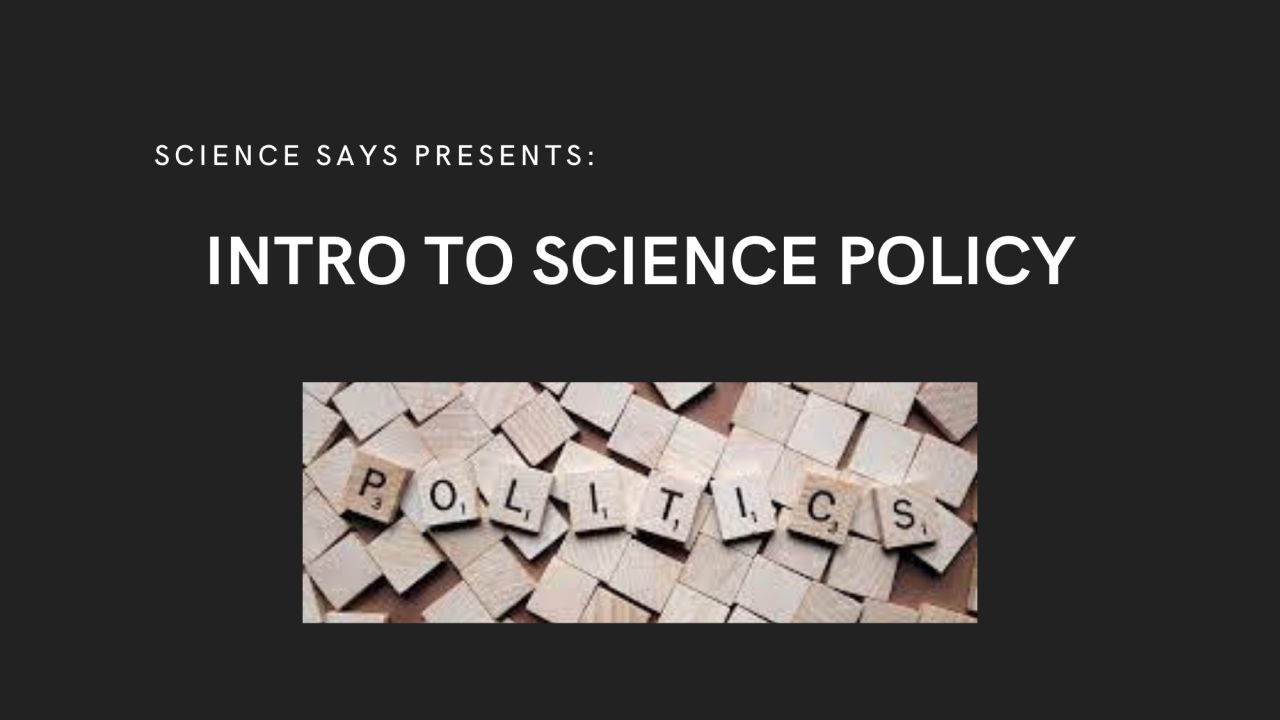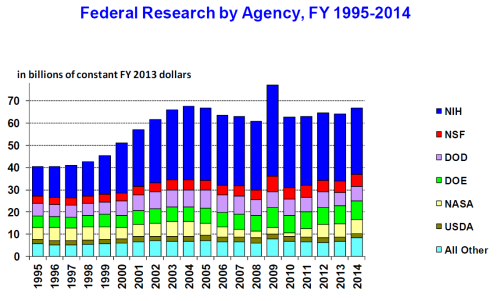
Introduction to Science Policy
Quick Summary
- Science Says is excited to announce the launch of our science policy branch, spearheaded by Richard Tran! Our opening event covered what science policy is and how it fits in with science communication.
Science communication is a catch-all term for a variety of applications, like science policy. Often, science policy is thought of at the federal level of government, such as the suggestions handed down by the United States government and others regarding the pandemic response. But because science is so ingrained at all levels of society, science policy can start small at the town or city council level and spread to the state and federal levels.
Science policy is associated with the allocation of resources to conduct science with the goal of serving the public. For instance, the 2021 US Innovation and Competition Act establishes funding for semiconductor research/manufacturing, funding for wireless supply chain innovation and funding trending education initiatives like computer science. The University of California system was formed from the Land Grant College Act of 1862, thereby serving the public interest of higher education and establishing research opportunities.
The government encourages the use of science for industrial development as well: the Advanced Research Projects Agency was created in 2009 to stimulate the economy by promoting new startup companies in the wake of renewable energy research. There are also plenty of examples of neglecting science policy. Agencies like the National Weather Service, NASA and the EPA suffer when they are neglected, and by proxy, so does the public. When the National Weather Service transitioned into the privatized Accuweather, decades of weather data became inaccessible to the public and has resulted in dramatic inaccuracies in forecasts, including mispredictions of extreme weather events like tornadoes and hurricanes.

Science policy isn’t restricted to just different levels of government; scientists can inform decision makers at non-governmental organizations (NGOs) such as the Green Science Policy Institute or foundations like the MacArthur Foundation. Science can even influence policies at businesses across different industries like the pharmaceutical companies Pfizer and Moderna or technology companies like Intel or Microsoft.
In the big picture, science policy is responsible for determining the budgets of different government funding bodies like the National Institutes of Health and the National Science Foundation. If these are neglected by policymakers, this directly affects the amount of funding awarded to researchers, which then has negative effects down to undergraduates in a university lab. Science is also responsible for influencing behind-the-scenes policies like unions advocating for health rights like sufficient maternal leave.
So how do scientists make any headway into informing policymakers? There are plenty of resources available to graduate students to begin exploring a career in science policy (listed below). Earning a STEM degree trains scientists in digesting and translating dense material quickly, which is vital for success in the fast-paced science policy field. Additionally, students can start by interacting with their local policymakers by writing memos or letters to provide information about how science should be applied to local issues regarding handling resources like water or properly implementing new technologies.
If you’re interested in more science policy events, keep an eye on our page and sign up for either our main newsletter or our interest form. We have an upcoming event with Colin Murphy, the Deputy Director of the Policy Institute for Energy, Environment and the Economy at UC Davis.
Resources:
- Journal of Science Policy and Governance - open access journal of policy research and writing submitted by early career researchers
- The Fifth Risk by Micheal Lewis - book discussing the harmful consequences of neglecting key scientific agencies
- The Premonitions by Michael Lewis - book discussing the implementation of science policy during the COVID-19 pandemic
- How to Avoid a Climate Disaster by Bill Gates - book discussing climate change and policies that can limit or stop it if implemented
- The Endless Frontier by Vandever Bush - book discussing why the US must support science based on World War II case study
- AAAS Science and Technology Policy Fellowship - a fellowship providing post-graduation PhDs and postdocs with experience advising policymakers in the federal government
- California Council on Science and Technology Fellowship - similar to the AAAS fellowship, but hosted by the California state government
- Christine Mirzayan Science and Technology Policy Graduate Fellowship Program - a fellowship providing post-graduation PhDs and postdocs with experience advising policymakers at the National Academies of Sciences, Engineering and Medicine
- National Science Policy Network - a network of scientists interested in science policy, including opportunities for skill development
Sydney Wyatt is a PhD student at the University of California, Davis. For more content from the UC Davis science communication group "Science Says", follow us on Twitter @SciSays.

Comments